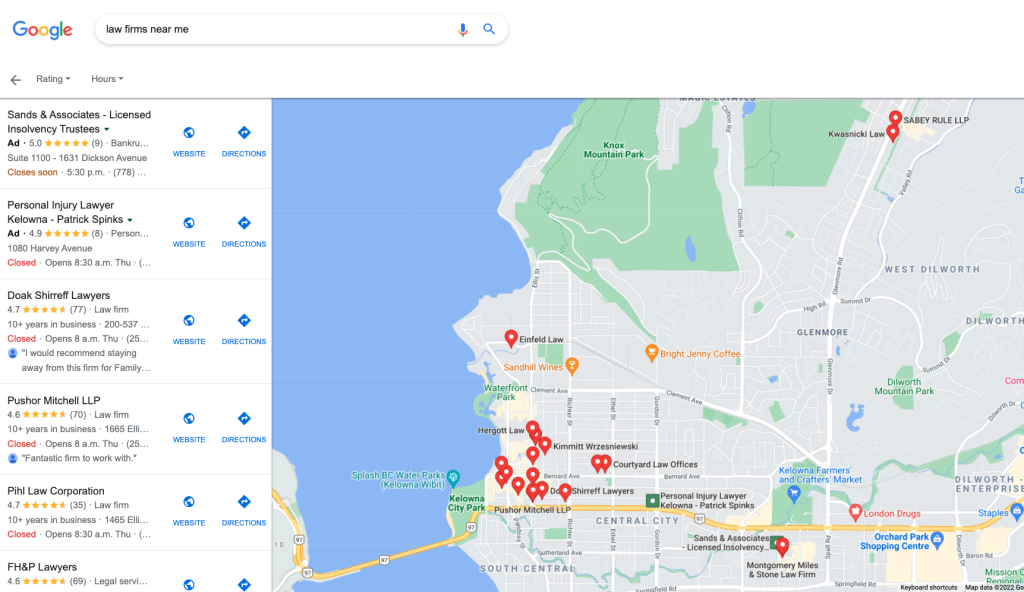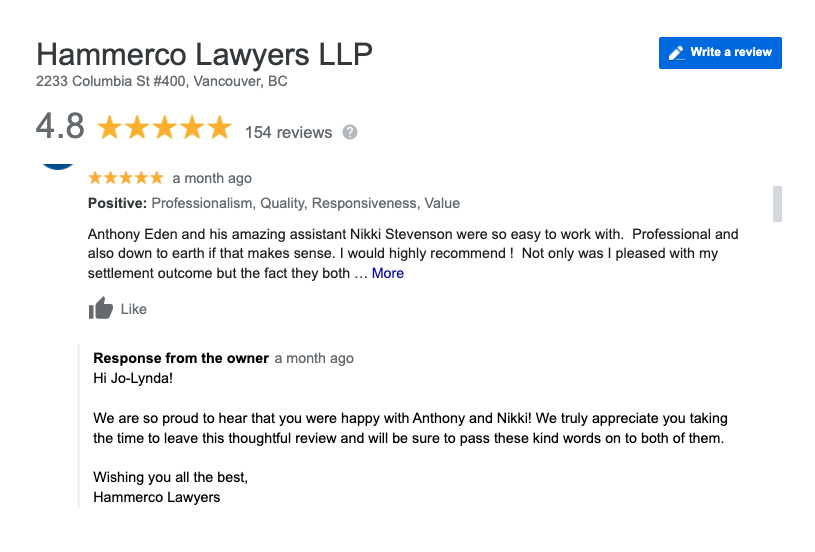In late January 2022, the US Federal Trade Commission published two articles in the wake of its first case relating to the deceptive practice of failing to post negative reviews. The first provided an outline of the proposed settlement with a California retailer which used a third-party review management software to automatically post 4- and 5-star reviews while not posting hundreds of thousands of reviews giving the company 3 stars or lower. The second, entitled “I’ll pay you to give this blog post five stars”, announced that the FTC has issued two new publications with guidance for US businesses about online review etiquette.
It’s clear that online reviews are top of mind for consumers (and, as a result, regulators) in 2022. This means law firms should be tapping into the power of online reviews in 2022.
3 Compelling Reasons Online Reviews for Law Firms are Important
Consumers Choose Lawyers with Online Reviews.
Online reviews have become essential for businesses operating in the online marketplace. They provide social proof to potential customers who might not be familiar with a brand, showing that a company can be trusted. Law firms that offer B2C services are no exception to this rule. In fact, a survey of 1000 US residents by Findlaw revealed that 81% of millennials would prefer to hire a lawyer with online reviews.
Given that reviews can be relatively easy to source, seeking customer reviews is an easy way to establish trust and gain a competitive advantage in the online space.
Online Reviews for Law Firms May Increase Local Search Visibility.
When a user types ‘law firm near me’ or ‘personal injury lawyer San Diego or any similar search like that into Google, their return results will show a map with businesses that match that search query. It looks like this:

Google determines which businesses appear first on the map based on its ‘local ranking factors’. To determine your law firm’s local ranking, it will consider three factors:
- Relevance – or how well your business profile matches the search query. So, if you’re a family law firm in Calgary, but the user searches for ‘corporate lawyer Calgary’, you’re less likely to rank highly for that term.
- Distance – or how far your business is from the user’s location data or the location term they specify in the search.
- Prominence – or how well known a business is. This is where your Google Reviews are important. Google considers the information it has about a business, including backlinks, articles, directories, and (importantly) the review count and review scores. In essence, more positive reviews can improve your local search visibility – and help more potential clients find your law firm.
Your Firm Can Glean Operational Insights from Reviews.
Both positive and negative reviews can help your law firm glean operational insights. In fact, it can be useful to consider each review you receive as providing feedback as to what your law firm is doing well and where it could be performing better. If you aggregate the data you receive from the reviews, you can adjust your business operations, prioritise investment in different customer facing improvements or technologies, and adjust your sales model to fit what your client base wants.
How Should Law Firms Ask for Reviews from Clients
One way we feel that law firm marketing differs from marketing in retail and other industries is that it’s not always a good idea to place a polite request for a review on your invoice and/or receipt. Law firm billing is an area that may cause conflict between clients and the firm so unless your billing hygiene is spotless (or you’re a fixed fee firm), it may be best to skip the request on the receipt (in our opinion).
Instead, these are the methods we suggest for law firms to ask for reviews from clients:
During a conversation.
Keep an ear out for compliments when you speak in person, over the phone, or during an online conference. When a client comments on the quality of your services, politely ask for a review in response.
It’s okay to be genuine when you ask your client for feedback. You might say something like “We’re hoping to receive some additional Google reviews. It would help us greatly if you shared your experience online!”.
Timing can be key here. Typically, it’s better to ask clients when you’re wrapping up their matter – not when they’re just getting started with your firm.
In your marketing email cadences.
You can leave a polite note in your marketing emails asking readers to provide your law firm with a 5-star review.
“We hope you found value in this email, please feel free to review us to help others find us too” . You should include a link to your Google or Facebook Reviews page to make this convenient for potential reviewers.
Ask for an online review for your law firm in your email signature.
You can easily place a “Review Us” link in your company’s email signature. Again, this should click through to the website on which you’d like your email recipients to leave a review.
Think outside the box, too.
Reviews can come from anyone who has benefitted from your wisdom. This includes people who attend conferences your firm provides or who receive resources your firm has provided. Simply add a request towards the end of your seminar or a short note at the end of your resource asking that people share their experience.

Obiter’s Best Practices for Managing Your Online Reviews
Respond to all reviews (including the positive reviews).
Your response to your law firm’s online reviews gives potential clients insight into your approach to customer service. By responding to all reviews, including the positive reviews, it shows that you value your client’s time and what they have to say – which is a crucial win for your brand.
It’s also a strategy that is currently underutilised by law firms. Very few respond to reviews at all, positive or negative. Of the few that do respond, most only respond to negative or poor reviews. You’ll likely need to spend some time digging to find a firm responding to positive reviews.
Finally, your responses to positive reviews give you the chance to humanise your team. This is valuable since it is sometimes difficult for law firms to achieve. This Vancouver law firm is doing a great job of this:

Keep the marketing purpose of online reviews for law firms in your mind when you respond.
Whenever you respond to a review (positive or negative), it is crucial to remember that your response to the review is not really for the benefit of the reviewer. Instead, you should respond with the broader audience in mind – namely, the people viewing your reviews to assess your law firm’s services.
It’s important that you appear courteous, friendly, responsive, professional, knowledgeable, and respectful – whether you’re responding to a positive or negative review.
Develop a strategy for responding to negative reviews.
Responding to negative reviews shouldn’t be something you do spontaneously. Each response should be measured and delivered with your marketing purposes in mind.
The impact of responding poorly to negative reviews should also be kept front of mind when you’re responding. It’s important to remember that arguing with the reviewer will (almost always) portray your law firm in a negative light.
Here’s our suggested methodology for responding to negative reviews:
- Develop a generic negative review response template.
- Ascertain what happened to cause the negative review internally.
- Respond publicly, with transparency, empathy, and potentially provide an incentive for the reviewer to reach out to you again.
- Include your name and, ideally, contact details at the end of the review.
- If they do reach out and the issue is resolved, ask for the review to be updated.
Ensure your law firm responds to online reviews in a timely manner.
You should strive to respond to reviews as quickly as possible. For positive reviews, your timeline for a response might be just 24-48 hours. For negative reviews, which will require a little bit more time, you might strive for 72 hours. However, it’s important to remember that you’re using your response to ask the reviewer to reach out to you again. Responding at the earliest possible time is more likely to make them feel valued and heard. In turn, they may be more likely to reach out to your firm to resolve their issues.
If you need assistance crafting response templates for your law firm’s online reviews, don’t hesitate to reach out. We’d love to help!







Leave A Comment
You must be logged in to post a comment.